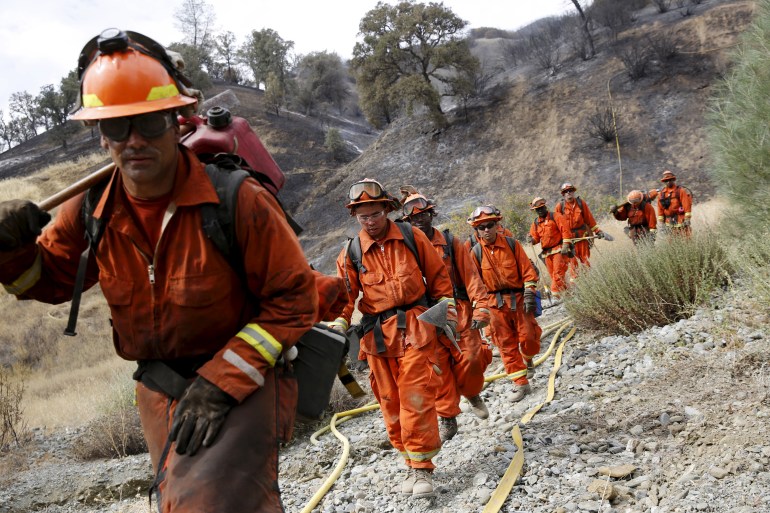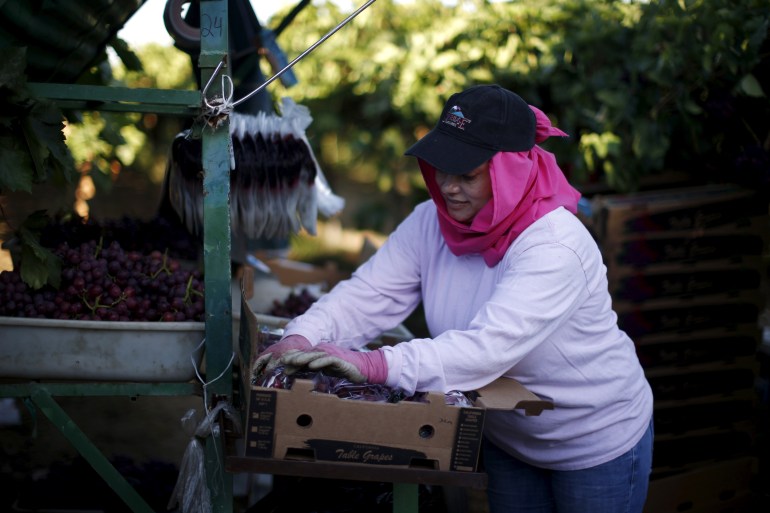Flames, smoke and heat: California grape workers push for change
Workers say they need better protections and support as ferocious wildfires become more frequent in California’s wine region.

Santa Rosa, California – In late September, residents of Sonoma County, one of northern California’s famous wine-making regions, received emergency alerts: the Fremont Fire had ignited, sending plumes of smoke over the dry, brown landscape and threatening nearby vineyards at peak grape harvest time.
When he heard about the blaze, Sebastian Alavez Gaspar, who picks grapes at harvest time, feared losing work. “If the boss loses his harvest, we won’t eat because we won’t have money,” he told Al Jazeera in Spanish over WhatsApp.
Keep reading
list of 3 itemsParaguay wildfires threaten Indigenous land and protected forests
Tourist sites threatened by raging US wildfires
Firefighters contained the fire the next day, however, and the following week Gaspar was called to harvest grapes. But the wildfire highlighted the precarity of the 41-year-old’s job, along with the jobs of some 11,000 grape workers in Sonoma County, and, amid record heat waves and climate-change fuelled blazes, systemic change is needed to better protect workers according to workers’ advocates.
“We need more protections; we don’t feel supported. When we lose weeks of work, there should be assistance for rent or food,” said Gaspar, who explained that his work is becoming more dangerous as wildfires increase in frequency and intensity.
“We are constantly worrying about the fire danger. Now, hearing that the probability of it will be worse is even scarier. But we also understand the urgency from the growers about the need to bring in the harvest.”
Pic from the Sleepy Mtn camera: #FremontFire pic.twitter.com/DoJJ7VAg2u
— Cascadia Fire Season (@barkflight) September 22, 2021
Tourist hub
Since 2017, wildfires have swept Sonoma County and neighbouring wine-producing counties with increasing ferocity.
Climate change is contributing to a longer, more intense wildfire season, which overlaps perfectly with the annual grape harvest from August to October in northern California, where locally produced wine attracts tourists from around the world.
The region is filled with vast fields of vines diligently manicured by thousands of workers. Intersections in wine country contain clusters of white arrows directing tourists to the vineyards. But in recent years, new signs have sprung up: “Caution! High-risk area: Due to recent fires, this area is prone to flash flooding and mudflows.”

The smoke from recent fires has spoiled grapes, and the flames have burned through vineyards, forcing many to close. While vineyards can collect insurance, grape workers have no backup plan; if they refuse to pick grapes in dangerous conditions, they will not make money. If the grapes are spoiled by smoke, there is no work for them.
The fires also have forced counties and the state to create a patchwork of new policies aimed at helping both vineyards and workers – but some policies are putting workers’ lives in danger in favour of profit, according to Teresa Romero, president of the United Farm Workers labour union.
“Anytime you put the lives of human beings in danger for profit, it is wrong. It happens, unfortunately, day in and day out in the lives of farmworkers,” Romero told Al Jazeera.
Evacuation zones
In 2017, when fires broke out across Sonoma County, the county’s Department of Agriculture created a system for vineyard owners and workers to enter evacuation zones to access their properties and take care of their crops and animals. The policy allows vineyard owners to send workers into evacuation zones to pick grapes.
To apply for “Verification of Commercial Agricultural Operation for Temporary Restricted Access”, owners must fill out a form describing the “critical and essential” tasks they must complete on their property. The county agricultural commissioner sends the form to the sheriff, who allows them access.
The form contains a liability waiver stating that the requester is solely responsible for the people they send into a wildfire evacuation zone, and they will not sue the county for injuries or losses. Sonoma granted hundreds of these passes in 2020, according to records reviewed by Al Jazeera.

Maria, a grape worker who did not want her last name used for fear of losing work, said her employer brought her into an evacuation zone to pick grapes in 2020. She said they had to ask permission for police and firefighters to let them enter the evacuation zone. As she picked grapes, she said the area around the farm was burning.
“I was very scared,” she said in Spanish through a United Farm Workers representative and translator. “Even with masks it was challenging to breathe,” she told Al Jazeera. “We would take them off because we needed relief.”
Sonoma Agricultural Commissioner Andrew Smith declined an interview request from Al Jazeera and did not respond to questions about the policy.
In an interview with Reveal, Smith said the economy would take a hit if farmers stopped working every time a fire ignites. “That sends a huge ripple effect through the local and even beyond the local economy. Farming doesn’t stop because mother nature deals us a bad hand,” he said.
Health effects
Maria and Gaspar said they feared health effects from smoke exposure; wildfire smoke contains dangerous particles that harm respiratory and cardiovascular systems and can cause premature death, according to a recent study.
On September 27, Governor Gavin Newsom signed into law Assembly Bill 73, the Farmworker Wildfire Smoke Protections Act, which would give workers better access to N-95 masks, requires the state to post wildfire safety guidelines for farmworkers, and requires employers to provide training for farmworkers on these guidelines in their first language.
But Gaspar said N-95 masks are not enough.
In 2020, as several large fires ignited and burned through vineyards in Sonoma, a vineyard owner called him to harvest grapes; thick smoke had settled over the vines, which can ruin the taste of grapes, but the owner received test results that said they were not yet spoiled, Gaspar told Al Jazeera.

Gaspar said he worked night and day for a week. During harvest, he is paid by the number of grapes he picks, not by the hour, so he worked as fast as he could. He sends a portion of his wages home to his sick mother in Oaxaca, Mexico to pay her healthcare bills.
The vineyard owner gave him cold Gatorade and an N-95 mask for the smoke, but it was hot and hard to breathe, so he took off his mask. His eyes were bloodshot and his throat burned. “The masks are a joke,” he said. “We need breathing apparatus like the firefighters have.”
California also has heat regulations that state if the temperature reaches above 35 Celsius (95 Fahrenheit), managers must give workers a break. Workers can request a break at any time, California’s Department of Industrial Relations told Al Jazeera in an email after this article was published. Employers are also “required to encourage workers to take a break in the shade whenever needed to prevent heat illness”. But these rules are difficult to enforce.
California also has heat regulations that state if the temperature reaches above 35 Celsius (95 Fahrenheit), managers must give workers a break. Workers can request a break at any time, California’s Department of Industrial Relations told Al Jazeera in an email after this article was published. Employers are also “required to encourage workers to take a break in the shade whenever needed to prevent heat illness”. But these rules are difficult to enforce.
“The laws on the books are not the laws in the fields,” Romero told Al Jazeera.
She said there has not been enough enforcement of labour laws historically in California, and added the state needs to hire more inspectors and also protect farmworkers who risk their jobs to report violations. “It’s not just getting bills passed, it’s ensuring they get enforced,” she said.
Workers’ demands
On a hot September afternoon, Margarita Garcia, a Mixteco Indigenous farmworker and community leader from Tlaxiaco, Oaxaca, relaxed in her kitchen in Santa Rosa, a city of 179,000 in the heart of Sonoma County, after working all night, harvesting grapes.
Max Bell Alper, executive director of North Bay Jobs with Justice, a grassroots coalition of groups organising workers on the front lines of climate change, sat across from Garcia at her kitchen counter and translated. Garcia and Bell Alper are working together to push for protections for grape workers, and they have held regular meetings with workers.
“Every meeting more people are coming and we’re getting stronger,” Garcia said.
Grape harvest has started & farmworkers are laboring in smoke, heat, & increasing wildfire risk. On Saturday, 55+ people (farmworkers, faith leaders, doctors, teachers, & more) came together to visit more than 30 wine industry businesses to speak out in support of farmworkers! pic.twitter.com/CXTLKUlYzq
— North Bay Jobs with Justice (@NorthBayJwJ) August 25, 2021
Wearing an N-95 during a grape harvest feels like running up a mountain with a mask on, Garcia said, and giving workers masks does not solve underlying structural problems in the industry. “When the smoke is bad, we should stop working,” she said.
That is why workers need disaster insurance, Bell Alper said. “The reality is, people have the economic need, and they’re going to work unless there’s a system in place that allows them to get paid,” he said.
Jobs With Justice recently surveyed 100 grape workers to find out what they need when fires break out. Their top priority was access to safety and evacuation training and other information in languages they understand; not all workers speak Spanish and many speak Indigenous languages.
Workers also said they wanted disaster insurance for income lost due to wildfires, safety observers from the community to be dispatched when state authorities cannot enforce the rules, hazard pay for working during wildfires, and clean bathrooms and water. California law states toilets and drinking water must be clean, but workers said they are often dirty.
Workers need fundamental change, Garcia said, and that’s what they are pushing for. “If a tree is always giving bad apples, we need to pull this tree up by the roots,” she said.
